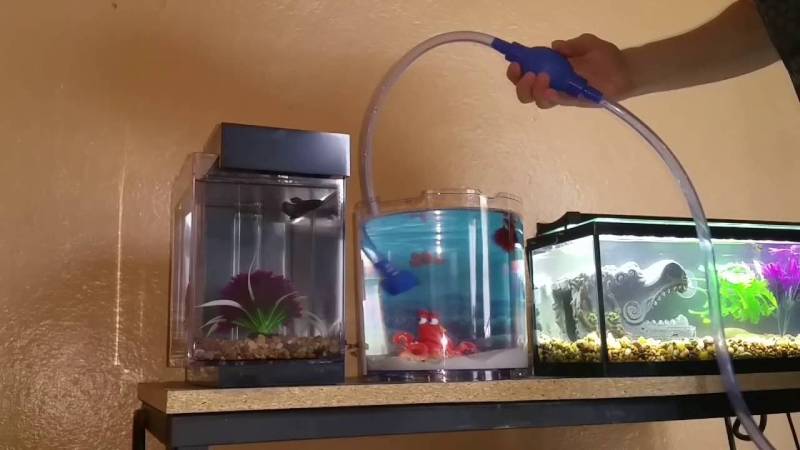Betta fish are known to be colorful fish, ranging from blue, red, green, etc. However, many people came to me asking, “Why is my betta fish turning white?”. Yes, they sometimes turn white and even lose their beautiful color or fade. That even happened to my betta fish. Thanks to my years of experience, I have learned why they turn white and how to cure them.
In the case that you’ve noticed a change in color recently in your betta fish, while your immediate instinct may be to worry, it may not necessarily be a cause for concern.
Betta fish turning white can be caused by a variety of factors, so if your betta fish’s color has changed, this article will help you find the cause and best cure.
Why Is My Betta Fish Losing Color?
Your betta could lose color for many reasons. Therefore, if you are aware of the different causes of color change, you may be able to arrive at the right solution. Below, we will list some of the main reasons.
Stress
One of the most common reasons that your betta fish starts losing color is stress. They need a healthy living environment, healthy diets, and regular access to clean water. If you don’t do this, your betta will become stressed and their colors can be lost.
In addition, for bettas to be happy, their aquariums need plenty of decoration, lush plants, and toys.
Age
Betta fish live an average of 1-3 years, if they are well taken care of, they may live up to 5 years. The age of betta fish is proportional to their colors. When they are older, their colors will gradually fade. Bettas can begin losing their color even as young as 2 years old. This is a very natural thing of the aging process.
Illness
Although not all color changes are dangerous, various illnesses and diseases can cause color changes in betta fish. In most cases, this is going to be a color change to white. However, any color change can be affected by a specific disease. Even so, not all diseases cause the Betta to turn white, so you need to be familiar with these diseases in order to identify them immediately.
Injury
Sometimes, your betta may lose their initial color when they are healing from an illness or after they’ve been injured. When their fins grow back from being damaged by fin rot, they may have a lighter or darker color compared to their initial color. You don’t have to worry in this case as it is just a normal part of the healing process.
Why is my Betta Fish Turning White?
When it comes to changing colors, your betta fish can turn black, turn into a lighter color, or a darker color. But if your betta starts turning white, the problem seems a little more serious.
Similar to the loss of color, there are also a variety of reasons as to why your fish may have turned white
Stress
Although we mentioned that stress might cause your Betta to change colors, you shouldn’t ignore it. You can not imagine exactly how much stress can hurt your betta fish.
Of course, stress doesn’t always cause turning white, but I have seen many cases. Especially if your fish is naturally pale, it might very easily happen that your betta becomes whitish when stressed.
Making sure that your Betta is in good health and free of stress is one way to prevent this from happening.
Columnaris

Columnaris is a bacterial infection that is somewhat common in bettas. One sign you may recognize this disease is fluffy white spots on your betta. If you see those white spots on betta’s body, you can doubt your fish has suffered from Columnaris.
In addition to the white spots, it is also possible for your Betta to have sores or ulcers on the body or fraying fins if they have Columnaris. If your betta is part of a community tank, you really need to check the other fish in the tank for this disease because this disease can affect all of them.
When moving the infected fish to a quarantine tank, set up tank conditions according to the following standards: First, set the temperature of the tank lower than Betta usually likes, which is about 75 degrees. You may ask why we have to do this, right? Because bacteria often grow well in a warmer environment, a lower temperature is necessary to slow down the infection.
Second, you should add some aquarium salt to the tank. For every 5 gallons, add about a teaspoon of salt. While you are isolating the infected betta in another tank to treat, you must also change the water in the main tank to remove any remaining bacteria. But you should not replace all the water at the same time. Only change 25% of the water in the tank each time.
Anchor Worms
Your betta can also turn white if it is infested with anchor worms. It happens mostly when you’ve just introduced a new fish to the tank. The anchor worm is a tiny worm with a variety of colors, though they are most commonly white. When your Betta becomes infected with worms, he may become lethargic or find it difficult to breathe.
When your Betta has anchor worms, you will probably notice it scratching against objects in the tank to attempt to pull the worms off of it. These worms can lead to red spots and sores, so treat them as soon as you see them.
The best way to get rid of the worms is to actually catch the betta so that you can remove the worms by using tweezers. It is best to approach the head of the worm as close to it as possible. Because your fish are out of the water, you must work quickly. You should also give bettas breaks to recover and catch their breath in the quarantine tank.
Don’t rush to bring it back to the main tank, you should keep the betta in the quarantine tank. Use some salt in the quarantine tank and try some parasite treatments available at the pet store.
Ich
The other disease that can cause white spots on your Betta is Ich. The infestation of this parasite can spread rapidly and will cause a loss of appetite as well as lethargy in your fish.
Additionally, you may notice that your Betta fish rubs its body against objects in the tank to get rid of parasites. Luckily, ich is easy to treat and get rid of. To prevent ich from spreading to other fish in your tank, quarantine your Betta fish and treat it right away if you suspect it has ich.
What Can I Do To Improve My Betta’s Color?
You want the Betta’s color to change in line with your wishes and want to prevent losing color, but unfortunately, if the color change is due to natural factors (e.g. aging), then this cannot be prevented.
Therefore, Betta’s color change can only happen when there is some external influence. You can refer to some ways to change the color of Betta according to the list below
Improve Water Quality Of The Tank
The cleanliness of the water directly affects the health of betta fish, including their color. So, improve the water quality as soon as possible and always make sure the condition of the water is suitable for your fish.
Choose The Right Size Of Tank
Betta fish need a minimum living space of 5 gallons – this is the ideal size for its growth. Don’t be too big, and don’t be too small.
Do Regular Water Changes

Surely no fish likes to live in a dirty tank full of bacteria. So, change the water regularly in your aquarium depending on the size of the tank: small tanks need water changes more often than large tanks. For example, a 10-gallon tank should get a 30% water change every 2 weeks.
Feed Your Betta Color Enhancing Food
In addition to a good living environment, give Betta more nutrients from the inside. Those are foods rich in protein and vitamins that help them improve color more quickly.
You can choose from living, freeze-dried, flakes, or pellets food depending on your Betta fish’s preference.
Don’t keep too many fish in the tank
Instead of overstocking your aquarium, stock it wisely and rationally. The 1 gallon of water per inch of a fish rule is something that you need to keep in mind when you want to raise a Betta. But do not apply it rigidly. Learn about the needs of each type of Betta before raising it.
FAQs
Why is my betta fish turning black?
Betta fish turning black is usually a completely natural occurrence and is not a cause for concern. However, if your betta suddenly turns black for no apparent reason, there may be signs of disease or stress.
A Betta fish will usually turn black as it matures. It is mostly reflected in their fins, which are gradually becoming darker as they grow. However, environmental factors may also contribute to the betta turning black. The reasons for this are water conditions that are inappropriate, stress, and infections, such as black spot diseases.
How long does it take for betta fish to regain color?
How long it will take to restore the color of your betta depends on what caused the change. Color may return within a few days in some cases. It may take several months in some cases, but it can also take much more time. When the reason for the color loss is due to stress, the Betta will be able to recover fairly quickly as soon as the stress-causing factors have been removed and the environment has been stabilized.
What are the signs that my betta fish is suffering?
It may be that your betta is suffering from a critical condition if they are gasping at the bottom or surface of the tank, pale in color, have a limp tail fin, have unresponsive eyes, and have visible fanning gills.
Video About Why Your Fish Losing Color
Conclusion
Your betta may have been born with bright, beautiful colors, but that doesn’t mean that the colors will remain this way forever. The colors of a betta can fade or turn into other colors such as white for a variety of reasons.
It is sometimes possible to solve the problem by simply tweaking the tank or feeding the fish the right food. I hope that this article has provided you with useful information and helps you know how to deal with betta turning white.

Annette M. Chaney is an experienced marine biologist with over 20 years of experience as an aquarist and fishkeeper. She started her first aquarium at a young age, filling it with frogs and goldfish obtained from the ten-cent pet store.
Annette grew up caring for and breeding African Cichlids, which led to a hobby in high school that doubled as a profitable means. Attending Reed College gave her time to solidify herself as an accomplished aquarium caretaker with an eye for sales. After that, from 2009 – 2013, she studied at Roger Williams University – one of the most prestigious universities for Aquaculture and Aquarium in USA. She is the founder of AquariumCircle since 2010.
